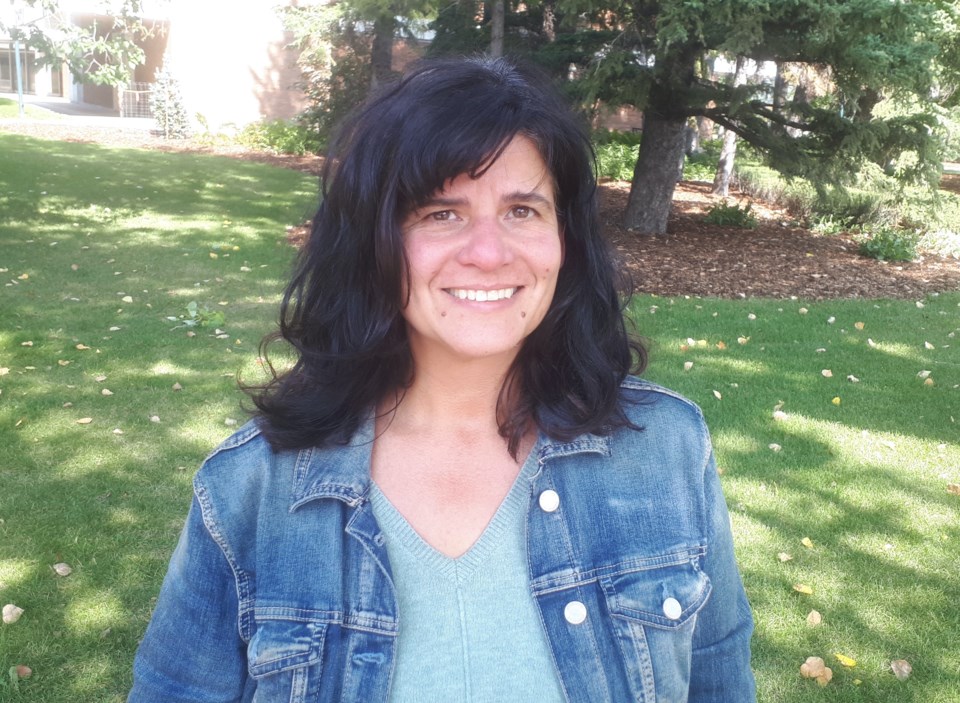BOWDEN — An evacuee from the wildfires that threatened Yellowknife made it all the way to her uncle’s place in Bowden Friday night after a harrowing two-day trip.
She believes she and her partner made the right decision to flee, despite word those fires now may not hit the city.
Late last week, the 22,000 residents of Yellowknife were told to evacuate the capital of the Northwest Territories because at least one wildfire was dangerously close to the city.
On Saturday, officials said it looked like one major fire several kilometres away may not reach its boundaries by the weekend as predicted earlier, due to some rain and cooler temperatures. However, they warned that it still could enter the city.
“Well, who knows,” Tracey Bryant said during an interview with the Albertan.
“I mean, there were some people who said, ‘we're not leaving,’ you know, being stubborn. But I don't think I'm going to regret leaving. I think that was the right decision.”
Bryant, a 51-year-old woman who makes and teaches art, has lived in Yellowknife off and on over the decades. She’s been back in the city since about 2000.
Bryant heard about fires in the general area during the summer. But it wasn’t until last week that the situation became really threatening.
And even then, although big clouds of smoke could be seen closer and closer to the city, she didn’t think she’d ever actually have to leave.
But as time went on last week, the situation became more worrisome.
Her brother phoned on Tuesday and urged her to leave. She also began to notice more and more people leaving, lineups at gas stations and lineups of people looking to take flights out of town.
She was also reluctant to go as she was in the middle of conducting an art camp for kids and was exhausted from the long days that entailed.
Bryant said it was also confusing because for days – until about Wednesday – she felt like there was no clear signal from government officials as to whether to evacuate or not – and if so, where exactly to go.
She said about 10 years ago “a really bad fire season” occurred and smoke came into Yellowknife, but there was no evacuation order so she found it hard to believe there would be one this time.
She admitted however, that the air quality was “really not that great. It was very uncomfortable. People getting headaches, people getting sick.”
More and more water bombers could be seen in the skies and fire breaks were being created around the city.
“And no sound of birds, you know,” she said. “It was just a feeling of ‘the animals have left.’
Finally, the call came to evacuate the city by Friday. So on Thursday morning, Bryant and her partner, a tattoo artist, decided it was time to go.
She grabbed the things she considered to be irreplaceable, like photos of her three kids (they were safe on vacation with their dad in Nova Scotia), birth certificates, passports, mementos, laptop, hard drive, memory sticks and some artwork of hers and a daughter.
Her partner grabbed his tattooing equipment.
She left behind lots of art she had made for an upcoming exhibition as well as art supplies, as she still had a feeling of unreality about the whole thing, like the government call to leave was a case of being “overzealous.”
“I felt like I was in the pandemic. It was it was like, this is happening again, you know, like, your life being disrupted,” she said. “We felt like refugees.”
They left at about 12:30 p.m., taking their four-year-old dog Rifle with them. He slept virtually all the way.
It was ghostly as they drove past swathes of burnt forest still smouldering, with little tongues of fire still present. (They took some photos for posterity). Rain likely helped quell the flames.
They made it to High Level at about 8:30 that night, planning to sleep in a hotel, but they were all full – especially those that allowed pets.
An evacuation centre was jammed too and was even out of cots to sleep on.
Bryant did think about pushing on to Peace River but suspected the situation there wouldn’t be any better. So like many, they ended up sleeping in their van.
The next they drove all the way to Bryant’s uncle’s home in Bowden.
Luckily, she said, their van was really good on gas and they had filled a jerry can in case it would be needed.
“We were doing this little game, like how many polar bear plates (do you see?),” Bryant said.
“And it was like every third vehicle, you know, going towards Edmonton was like ‘yeah, there's Yellowknifer.’
Bryant said when they reached her uncle’s place in Bowden, she felt great relief.
Now she’s not sure what the future will bring.
Bryant heard vague word that there might be some kind of compensation for evacuees.
But when interviewed on Saturday, she wasn't sure what the future would hold.
“We could be here for, I don't know, a couple weeks,” Bryant said.
“What if the whole town is burnt down? I know I tried to sort of push that back down.”
She’s worried that not only could she lose her home but that she may have to tell her kids that her father has lost his as well.
Bryant said luckily, her partner can likely start his business up again, having taken his tattooing equipment with him.
But she could lose virtually everything.
“To me it’s like, I've got 10 years of building this business that I do, and yeah, I left my whole life.”



